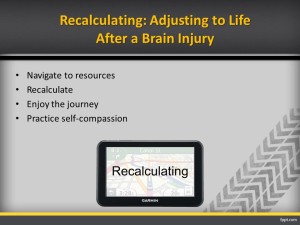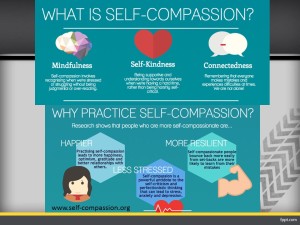It’s hard adjusting to daylight saving time, and every March I wonder who came up with the idea. Losing one hour in the Spring only to gain it back in the Fall doesn’t make any sense to me. I’m still working on getting all the clocks changed in my house, and my body is still trying to adjust to the lost hour. Life is full of adjustments. Do we really need to add our clocks to the list?
The theme for our caregivers support group went perfectly along with the changing of clocks and adapting to the loss of an hour. Reviewing what I learned Thursday night on the subject titled, Adjusting to Life After a Brain Injury, will be beneficial to you because it can relate to any other health issue, or difficult circumstance that dramatically changes the direction of life.

Our presenter, Kerrie Neu, has been a caregiver for nearly 20 years. In June 1998, her husband, Laurent, was in his last quarter at the University of Utah, majoring in Communications. He walked in the graduation ceremony since it is only offered in June. He would finish up his classes in the Fall. However, a motorcycle accident in Salt Lake City, on July 4th changed those plans. He was in a coma for several weeks and in the hospital for three months with ongoing outpatient therapy.
 Kerrie brilliantly used a GPS theme for navigating in unfamiliar territory. They had to recalculate life and reroute to their best resource, family. With two small children ages four years and fourteen months old, they moved into Laurent’s parent’s home for three years. “It’s hard not to look back and want to make a U turn,” Kerrie said. “With brain injury, there’s no going back to the life you had before.”
Kerrie brilliantly used a GPS theme for navigating in unfamiliar territory. They had to recalculate life and reroute to their best resource, family. With two small children ages four years and fourteen months old, they moved into Laurent’s parent’s home for three years. “It’s hard not to look back and want to make a U turn,” Kerrie said. “With brain injury, there’s no going back to the life you had before.”
 At first, Kerrie said she lived in survival mode with her main focus on recovery. Some of the other short term adjustments we discussed were, home structure renovations like ramps and a modified bathroom, which may be necessary if the survivor needs a wheelchair. Other changes are family responsibilities, employment, and finances.
At first, Kerrie said she lived in survival mode with her main focus on recovery. Some of the other short term adjustments we discussed were, home structure renovations like ramps and a modified bathroom, which may be necessary if the survivor needs a wheelchair. Other changes are family responsibilities, employment, and finances.
Some of the long term adjustments discussed were schedules for therapies and doctor appointments. Ongoing fatigue may make a schedule nap-time necessary. Employment is a big one. Is working a possibility? If so, will it need to be part time work, or possibly a new job? Financial concerns and changes in family roles can continue long term. Daily activities may be altered by physical and cognitive capabilities. Social skills may vary, especially on days the filters aren’t working proficiently. Some friends and family may find it hard to relate to the new situation and distance themselves.

Click here to read: Holland Instead of Italy?
Kerrie pointed out that we can’t see into the future and we don’t know what our new destination will be. She suggested celebrating milestones, moments, and memories along the way. On our journey there will be times we need to recalculate. Be flexible and open to new ideas. Discover new routes and destinations. Find joy in every-day moments.
My favorite points Kerrie made were:
*Living in the past isn’t the way to enjoy the journey we’re on now. Look for things every day that bring you enjoyment. Make today worth remembering by:
- Mindfulness in the morning, “Today I will celebrate one thing.”
- Mental photos, or real ones, “I want to remember this moment.”
- Nightly reflections, “What can I celebrate or remember from today?”
*Our bodies are the vehicle that gets us through life. A car needs gas and repairs. Likewise we need to navigate to doing whatever fills us up. When we break down, we should do what it takes to get the help for a repair. Don’t forget to stop at the rest areas when needed.
* Four tasks of grief by J. William Worden
- Accept the reality of the loss
- Process your grief and pain
- Adjust to the world with your loved one being different
- Find an enduring connection to the person while embarking on your own life-
A counselor can be helpful in this process since we experience ambiguous grief or ambiguous loss.
 *The GPS doesn’t yell at you when you make a wrong turn “Idiot, why did you turn that way? If you had only turned left instead of right we wouldn’t be in this mess!” It simply says in a calm voice: “Recalculating,” and gives new directions. We should talk to ourselves in that same patient way, with self-compassion.
*The GPS doesn’t yell at you when you make a wrong turn “Idiot, why did you turn that way? If you had only turned left instead of right we wouldn’t be in this mess!” It simply says in a calm voice: “Recalculating,” and gives new directions. We should talk to ourselves in that same patient way, with self-compassion.

*Self-compassion is:
- Self-kindness: Be understanding of yourself when you suffer, fail, or feel inadequate
- Connectedness: Recognize suffering and personal inadequacy is a shared human experience
- Mindfulness: Balanced approach to negative feelings: neither suppressed nor exaggerated
See: www.self-compassion.org by Kristin Neff
I enjoyed this topic and Kerrie Neu did an excellent job presenting it. Our life is full of recalculating and adjustments. It occurred to me that maybe the purpose of daylight saving is to give us some adapting practice for much harder experiences that come our way. Because honestly, who has an extra hour to lose?
Click to view slide presentation in full: Navigating After a Brain Injury


Good thoughts!
Love you, Mom
Sent from my iPad
>
Thanks Mom for reading! Our monthly meetings are enjoyable and helpful. This one was one of my favorites.